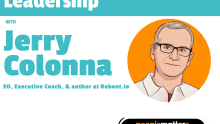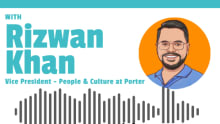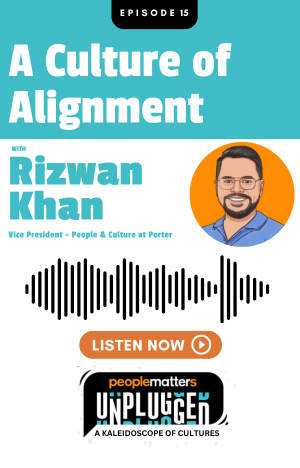The more ‘human’ changes have transformed the world of work for the better: QBE’s Vernon Griffith

READ the June 2021 issue of our magazine: The Digital Culture Reset
The world of work has undergone a drastic transformation since the COVID-19 pandemic sent the entire world into a tizzy. It not only accelerated the digital transformation journeys of organizations but also brought back the focus on people and on creating an ideal employee experience in these uncertain times. For HR leaders, it has been an equally transformative time. They had to plan for these transitions overnight and had to put their best foot forward to ensure that they maintained business continuity while keeping people at the core of it.
As the Global Head of HR Service Design & Delivery for QBE, one of the world's top 20 insurance and reinsurance companies, Vernon Griffith leads a team of 60 people - from HR service specialists in Manila to business analysts in Sydney - to support more than 12,000 employees in over 30 countries. Vern proudly steals techniques from Marketing and Manufacturing to deliver a tangible difference in HR. Prior to QBE, Vern worked in large-scale HR transformation programs at some of the world’s best-known global companies, including Shell, BP, British Telecom and Deloitte. As a curious watchman of the rise of Artificial Intelligence in HR and the workplace, Vern is the founder and curator of the news website www.machinesinsuits.com.
In this exclusive interaction, Vern talks about some of the biggest learnings he has had from the pandemic as an HR leader and how technology will unlock new ways of working in a post-COVID-19 world. He shares that though there has been a lot of discussion around the digital acceleration that has happened during the pandemic, it’s probably the more ‘human’ changes that have been compelling for him.
Here are the excerpts from the interview.
Please take us through your career journey so far? Did you always want to be an HR professional? What triggered this change for you and what encouraged you to become an HR professional?
Like many folks in this profession, I think HR chose me rather than the other way around! I studied Mechanical Engineering for my first degree, but I didn’t really warm to the prospect of working on engines as a career. On leaving university, I didn’t know what I wanted to do. So, I briefly worked in Marketing, before joining a small IT consultancy specializing in SAP. Of all the modules we were trained in, HR was the most appealing to me, perhaps because I could relate to people more than widgets. Nearly 25 years on, and with more than a few HR transformation projects and a Master’s degree in International HR Management under my belt, I’m fortunate enough to be the Global Head of HR Service Design and Delivery at QBE.
MORE FOR YOU...
- Cisco’s Fran Katsoudas on seismic shifts in the world of work
- Rob Rosenberg, Global Head of HR, DHL Supply Chain on driving a winning culture
- Ruth McGill, CHRO, ING Bank on purposeful transformation
The past 1.5 years have been the one most unprecedented times we have ever seen. What have been your biggest learnings from this pandemic-led transformation in the world of work?
There’s been a lot of discussion around the digital acceleration that has happened during the pandemic. And that has certainly been the case. However, it’s probably the more ‘human’ changes that have been compelling for me.
Changes like the general acceptance that people can be trusted to work from home, the examination and unbundling of the purpose of the office, and the development of ‘offline’ (asynchronous) working. I strongly believe that they have transformed the world of work for the better.
The pandemic brought back the focus on how organizations engage with their people and how important employee experience is. The role of technology has also become critical in doing this in a remote/hybrid working model. What are your thoughts on that? What has particularly changed in your view?
Employee experience can be thought of as a combination of physical, cultural and digital experiences. All three have been brought sharply into focus during the pandemic: Physically, we’ve had to adjust to workers working from anywhere and what ‘return to office’ might mean in terms of building occupancy; Culturally, as we onboarded new colleagues remotely, we had to consider what’s important in our culture and how we share it, when so much of it (artefacts, rituals stories, etc.) have been bound into the building in which we worked; Digitally, we’ve embraced collaboration and listening (survey) platforms meaning that work has continued largely interrupted online, but also realized that a being ‘always-on’ is not great for well-being.
There have been so many learnings and changes. But the biggest shift for me is the erasure of the pre-pandemic notion that working from home is an exception; it is now the norm.
The pandemic accelerated the digital transformation journeys of almost all organizations. In your experience, what have been the biggest technological shifts that you have observed in this time period?
We have all witnessed huge shifts in how we collaborate using technology, with the rise of Zoom, MS teams and others as platforms to support connection and interaction. There’s also an increased focus on the adoption of solutions to support employee well-being and automation to handle repetitive tasks. I’ve also heard about the increased use of employee monitoring solutions through the pandemic, as some organizations look to digitally track their employees’ work and provide screenshots and action logs to their managers at intervals throughout the day. While not a new phenomenon (IT departments have had access to similar usage data), I’m not a fan of these ‘big brother’ surveillance solutions as I feel they erode trust.
How will technology unlock new ways of working in a post-COVID-19 world?
I believe that post-COVID-19, we will see further adoption of automation and augmented intelligence across all areas of the organization.
Soft robots or automation will be utilized to carry out rules-bound activity and deliver higher levels of quality (as we’ve seen with hard robots in manufacturing), while augmented intelligence will be used to unlock hidden patterns in data, leading to new insights and better decision-making.
However, to paraphrase William Gibson, a science fiction writer, the future won’t be evenly distributed. As has always been the case, we will see different levels of technology adoption and maturity across organizations.
Can you share some examples of how QBE Insurance has leveraged technology to enable a smooth working environment in the remote and hybrid working model?
We are currently in the process of rolling-out an AI-enabled skills-based learning platform which will support remote learning. This solution uses machine learning to identify skills and skill levels from a person’s job profile. Each skill level is then linked to relevant learning content. The platform then provides an employee with a clear indication of the skills expected for their role and personalized learning recommendations. This is our first step in the skills journey. I’m expecting skills development and talent mobility to be an increasing area of focus for QBE in the coming years.
How will technologies like AI, robotics, and automation impact the HR function? According to you, how will these change the way people-focused roles function five to ten years down the line?
The adoption of new technology will require a commensurate build of digital skills across the organization. With the half-life of many of these technical skills only expected to be 5 years, the need for learning, unlearning and relearning will continue to grow in-line with the pace of change. HR clearly has a key role to play in ensuring that our people are not only able to survive but thrive in this kind of future. With this, I expect well-being to continue to be a key area of focus, as some struggle to adapt to the demands of this way of working.
QBE has started a program to introduce intelligent automation (digital workers) alongside human colleagues. Can you tell us more on how this journey is progressing. What are the benefits and challenges of integrating a digital and human workforce?
In QBE HR, we have started to increase our use of automation for admin tasks.
As an example of this, we’ve developed 6 bots to automate ‘fit and proper’ compliance activity in our UK organization. Just one of these bots has reduced the time needed for the preparation of compliance certificates from 2 days to 28 minutes, with no errors.
My colleague described the bots as, “Christmas come early!” We’re also introducing more automation in our global HR shared service function to support activities such as query management and contract generation.
It’s still very early days for us in HR in terms of embracing automation, we’re only just scratching the surface, but I can see a huge opportunity for this type of technology ahead.
What advice would you give to HR leaders who are working on transforming their HR function and enabling digital transformation at their organizations?
Deeply explore and understand the needs and priorities of your customers (employees and HR) to ensure that real business needs will be met through any transformation activity (avoid SOS – Shiny Object Syndrome!).
Be curious and build your personal and team’s knowledge around the opportunities that smart technology can present. You can do this by partnering with IT and your existing HR technology vendors, attending industry events, and reading about new developments. Finally, find the sweet spot that is the intersection between customer needs and what the technology can deliver, while being thoughtful about your future needs, technology integration and the employee experience.














